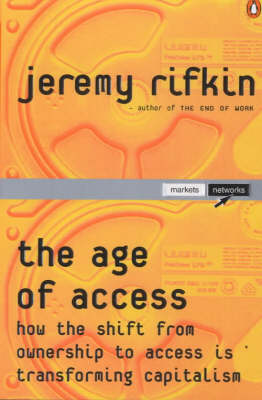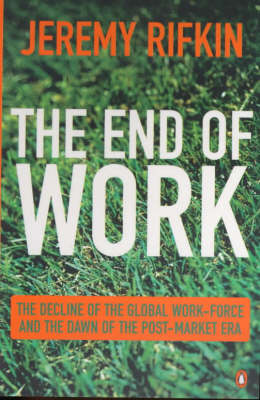Penguin Business Library
2 total works
Imagine waking up one day to find that virtually everything you do has become a "paid for" experience. It is part of a fundamental change taking place in the nature of business, contends Jeremy Ritkin. After several hundred years as the organising principles of civilisation, the traditional market systems is beginning to break down. On the horizon looms the "age of access", where we trade experiences instead of objects. In the hypercapitalist economy - characterised by continuous innovation and dizzying speed of change -buying thongs in markets an downing property becomes an outdated idea, while "just in time" access to virtually every kind of service, through vast commercial networks operating in cyberspace, becomes the norm. We increasingly pay for the experience of using things -in the form of subscriptions, memberships and leases -rather than pay for the things themselves. The bottom line: we are spending more and owning less. Similarly, companies are selling off property, leasing equipment, outsourcing activities and becoming "weightless". Ownership of physical property, once considered a valued asset, is now regarded as a liability in the corporate world.
"Lifestyle marketing" is th buzz in the commercial world as more and more consumers become members of corporate sponsored clubs and participate in corporate sponsored activities and events. The business of business, therefore, is no longer about exchanging property but, rather, buying access to one's daily existence in small commercial time-segments. In this book the author asks, will any time be left for relationships of a non-commercial nature? The changes taking place are part of an even larger transformation in the nature of capitalism. we are making a long-term shift from a system based on manufacturing goods to one based on the selling of cultural experiences. Global travel and tourism, fashion, food, sport, gambling, the virtual worlds of cyberspace and even social causes, are fast becoming the centre of an experimental economy that trades in cultural resources.
"Lifestyle marketing" is th buzz in the commercial world as more and more consumers become members of corporate sponsored clubs and participate in corporate sponsored activities and events. The business of business, therefore, is no longer about exchanging property but, rather, buying access to one's daily existence in small commercial time-segments. In this book the author asks, will any time be left for relationships of a non-commercial nature? The changes taking place are part of an even larger transformation in the nature of capitalism. we are making a long-term shift from a system based on manufacturing goods to one based on the selling of cultural experiences. Global travel and tourism, fashion, food, sport, gambling, the virtual worlds of cyberspace and even social causes, are fast becoming the centre of an experimental economy that trades in cultural resources.
Global unemployment has now reached its highest level since the great depression of the 1930s. Technologies which have brought miraculous improvements in efficiency and productivity have also slashed the numbers employed in manufacturing and agriculture, while the service sector is quite unable to take up the slack. While a tiny elite of "knowledge workers" -scientists, entrepreneurs an consultants - will still be in demand, most jobs are disappearing fast, resulting in the creation of a morose "underclass", caught between apathy and criminal violence. Such, argues the author in this powerful polemic, is our true situation today. We can either bury our heads the sand or urgently rewrite the social contract by expanding the independent (non-profit) third sector, cutting the working week and sharing out the fruits of progress. The choice will determine the future of us all.

